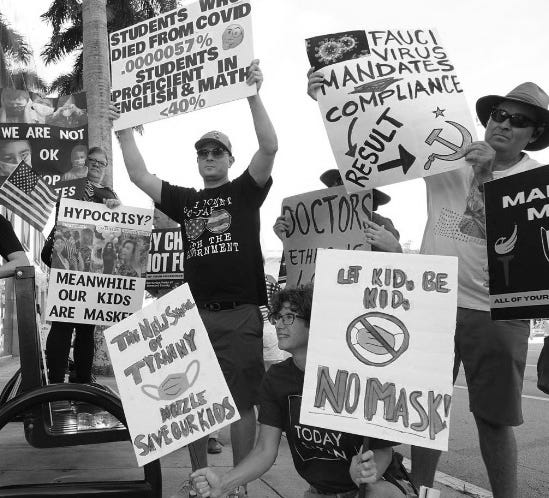The Man at the End of the Pew
The old man was an outlier in the early days of the pandemic and he didn't even know it.
He was an old man who sat alone at the end of the pew inside a sanctuary and he wasn’t wearing a face mask. It was May of 2020, at the height of the Covid-19 pandemic, and churches in Palm Beach, Florida had just begun reopening their doors after months of closure.
Located on every other pew was a sign that read ‘Closed for Social Distancing’ and ‘Please Wear a Mask.’ Spread out among the room were congregants, all masked, and all taking occasional glances at the old man showing his bare face.
The old man was not in good health. He was not coughing or showing signs of respiratory distress, but his skin showed brown and red blotches and deep wrinkles on his face reflected a man who had been badly aging for quite sometime. His clothes revealed signs of wear and poor hygiene and he held a walking stick, beat down from use overtime; a trusted companion, no doubt, to lean on during times of difficulty.
In the spring of 2020, state and local governments ordered residents to avoid gathering in large groups, including places of worship. A few pastors kept their doors open but most churches, synagogues, and mosques closed in-person services and went online. Zoom church and live streams went mainstream. The shift to online worship may have worked for some but churches who pushed away parishioners risked spiritual weakening and the effects of social isolation for the sake of ‘beating the virus.’
Isolation is a killer. Not only did pandemic restrictions and isolation have a tragic and deadly effect on nursing home residents, older people living alone were prevented from visiting with friends or loved ones at community centers, commercial settings such as the mall, and places of worship. The response to the pandemic may have indeed contributed to more death and disability than the virus itself. Only now have researchers begun to contemplate the detrimental effects, and how, perhaps, to avoid the same mistakes in the future.
Similar to lockdown restrictions, mask mandates polarized the public, creating a deep schism between maskers and anti-maskers. Through the pandemic, for at least the first year, masks were a sign of agreeableness, good virtue, and ‘following the science’. On occasion, mask wearers may have been called “sheep” or Virtue Signalers, but that was a small price to pay for what most of them would consider a civic responsibility.
Opponents of mask mandates cited constitutional claims such as ‘My Body, My Choice’ and government overreach as well as the accusation that masks do not work. The detractors of the time may have had a point but in Palm Beach County, specifically, and also around the country, mask opponents were threatened with civil citations, arrest, kicked out of school and places of business, shamed on social media, and of course, labeled as ‘grandma killers.’
Today, the mask debate is largely played out over Twitter among healthcare professionals, disgruntled journalists, and bewildered academics terrified of long Covid. But most places, both public and private, where large numbers of people congregate, have dropped the mandates entirely. Recent studies even suggest that masks did little to nothing to prevent the spread.
But when the old man at the end of the pew dared to show his bare face at church, he was the only one to do so. It was 2020, after all, and Covid panic was full swing. Most Americans were consumed with social distancing, taking temperatures, hand washing, watching the news, and of course, wearing masks.
The man never searched his pocket that morning for a mask. He never asked for a mask nor did anyone offer. In fact, no one said a word. He did watch, as other parishioners shuffled in, and turned every so often in his pew, moving side to side, and looking slightly alarmed.
What if he didn’t get the memo? What if he didn’t care? What if he was experiencing cognitive decline?
Odds are he refused to wear something many people considered dehumanizing and depraved and the old man knew he had little time left. Wearing a mask made no sense, and more importantly, it made no difference.
‘The Man at the End of the Pew’
The man at the end of the pew– He was an old man, haggard and gaunt, He wasn’t like me or you, Yet he stayed, and prayed, at the end of the pew. The man wore a face, tired and maimed, While ours was a face concealed, His eyes confused but unashamed, His lips moved and ‘Jesus’ proclaimed.



